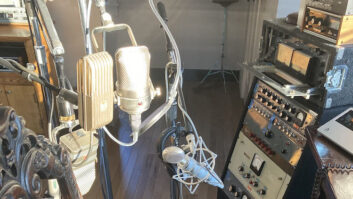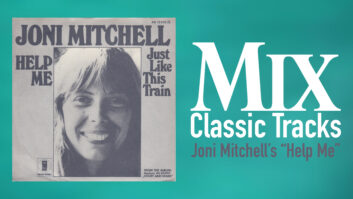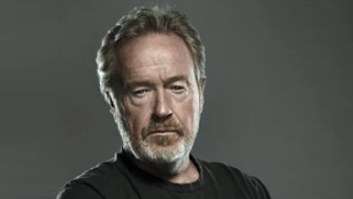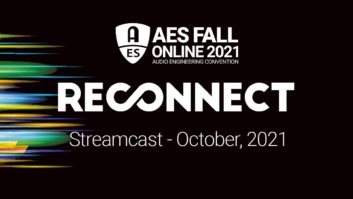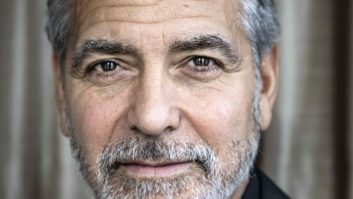Photo: Melanie Nissen
Proving that if it isn’t broke, don’t fix it, producer Joe Henry has just completed a string of seven-day recording sessions for artists as varied as Aimee Mann, Ani DiFranco, Susan Tedeschi and Bettye LaVette. “I’m finding that it’s the only way I know how to work,” Henry says on a break between the recording and overdub dates during Tedeschi’s sessions for Hope and Desire, arguably her strongest album to date. “I’m not sure that if I had a bigger budget that I would necessarily work longer. I don’t think it’s about wishing we could afford more time.”
Rather, Henry adds, setting that type of time frame for the recording dates changes the musicians’ perspectives. “I much prefer to cast the net on the side of the boat where people are thinking about performance. We always set up in a way that you can fix or redo anything,” he says. “It’s not like this locks you into a problem and that you’ve got to live with a vocal because we like this take. We can fix anything — it is the modern world and I like it. I am very much a fan of that dynamic thing that happens when people are in a room and trying to discover a song.”
While Henry is perhaps best known as an artist in his own right — his ninth and latest release, Tiny Voices, came out in 2003 — he first stepped into the producer’s spotlight in the late ’90s with such artists as Shivaree and Teddy Thompson. It was a career he first started contemplating at the suggestion of T-Bone Burnett, who produced Henry’s 1990 offering, Shuffletown. “When that record was coming out, I moved out here [to Los Angeles] and then I had a terrible falling out with A&M,” Henry recalls. “[Burnett] hired me to be like a production associate to be there when he was not.
“I immediately started working on a Bruce Cockburn record [the 1991 Nothing But a Burning Light] with him. That was a really significant record for me,” Henry continues. “I mean, there was Jim Keltner, there was Booker T [Jones III], Edgar Meyer — you know, a really great group of people to walk into a room. So I got invited into this camp working for T-Bone and he was always pushing me. He was like, ‘I need help, you need a trade.’”
Having the dual talents of songwriter and producer has helped Henry while he goes into work with Mann, DiFranco and Tedeschi. “I’m always thinking in terms of songs,” he says. “The song is everything to me, so what it takes for a song to feel like a living thing once you take your hands off of it is absolutely the endgame for me. I think the fact that I come at this as a songwriter, that’s my orientation, no matter what the genre of music. Whether I’m making a bluesy record with Susan or a more crafted songwriter record with Aimee, or Ani’s thing, which is so distinct to her, the common thread through all of that is the songs, no matter where they come from.”
In fact, dating back to the acclaimed 2002 Solomon Burke release, Don’t Give Up on Me, Henry has taken an active hand in selecting songs for artists. At Henry’s encouraging, Tedeschi tracked “Loving You Is Sweeter Than Ever,” which the Four Tops recorded; a Bob Dylan outtake, “Lord Protect My Child”; a Richie Havens song, “Follow”; and a Percy Mayfield tune called “The Danger Zone,” which came to their notice through a Ray Charles recording. “It is, at times, very bluesy, but there’s also a lot of very straight soul music, and I mean that in a very Motown way. It’s very raw and very live,” he explains of Tedeschi’s release. “It’s a much more viscerally raw record than I thought I would get away with making. It’s what I hoped to do, but based on her other recordings, I didn’t know if she or her label would be in favor of it going in that direction. She’s an amazing singer and is amazingly consistent. We talk about putting songs up, and with each song that comes on, you’re trying to find a way for this particular band to inhabit them and embody them in a unique way, and for her to find a way to sing them that’s authentic to her.”
The collection of songs that the legendary soul singer LaVette tackled for her latest album, I’ve Got My Own Hell to Raise, was all from female songwriters. “I was also involved in the A&R process of that record and it was really interesting to put together a collection of songs by women from many different sources,” Henry says. Among the songs on LaVette’s stunning disc are tunes originally cut by Sinéad O’Connor (“I Do Not Want What I Haven’t Got”), Dolly Parton (“Little Sparrow”), Aimee Mann (“How Am I Different”) and Joan Armatrading (“Down to Zero”), among others.
Henry’s experience with both Mann and DiFranco was different, in that he would bring unique talents to each session. “In Ani’s case, I’ve heard people ask her the question, ‘You’ve never worked with a producer before. Why him? Why now?’ I think we share a lot philosophically about the way records live, the way they can happen, the way they should happen,” he explains. Henry produced half of the songs on DiFranco’s latest disc, Knuckle Down, and all of Mann’s latest, The Forgotten Arm. “Aimee was looking for an aggressive third ear who was going to help her songs become something they weren’t already. I think she felt that her last two records were sonically of a piece and she wanted to step outside of that and do something that came from a different angle.”
Mann’s The Forgotten Arm definitely takes a turn from her more polished releases. “It’s got a lot more loose ends; a lot more hair on it,” Henry says. “That was a conscious decision. I remember when we were first having a conversation about working together, she said, ‘It would be great for me to work with somebody who doesn’t have The Beatles as their only frame of reference, as far as record-making.’ I said, ‘Well, that would be me, because I don’t have a clue. They’re nice songs, but I’ve not done the research that it was this mic on this amp pointed east toward the river.’ A lot of people seemed to be really well-versed in that bible of recording, but that’s not my orientation.”
Henry is not interested in engineering a session he’s producing and will often turn to engineer S. “Husky” Hoskulds. “Husky is like bringing another musician into the equation because he’s not just trying to document with high fidelity so that later we can figure out what to do with these tracks,” Henry says. “He, like any musician, is making choices. Many times on Susan’s record, we were running through something and Husky was dialing up a treatment, bringing a real point of view to what was happening. The musicians came in to hear a playback and were just flabbergasted at how stuff is being used. They’d say, ‘Oh, I get it. If you’re doing that, here’s where I’ll go with it.’ I rely on that because I don’t know how you’d recognize a song if you’re not treating the sonics as part of what you’re dragging into your boat. A guitar part in a vacuum doesn’t mean anything to me, but if I hear it treated this way, then I know what job it’s doing and I know what else I don’t need because of that.”
Henry’s quick to note that Hoskulds’ treatment is not for everyone and has added Ryan Freeland to the list of engineers that he’ll turn to for a project such as those for Mann or Jim White. “Ryan is the most musical Pro Tools user I’ve ever been around. It’s incredible what he does with the computer and how musical he makes that,” Henry says.
Henry also has a number of musicians he’ll turn to when casting a band around an artist, but he does not include himself on that list. “I don’t play on anything that I produce, as a rule. I’m not one of those people,” he says. Rather, he counts drummers Jay Bellerose and Victor Indrizzo; bassists Jennifer Condos, Paul Bryan and Dave Piltch; guitarists Chris Bruce, Jeff Trott and Doyle Bramhall II; and keyboardists David Palmer, Patrick Warren, Lisa Coleman and Jevin Bruni as members of his team.
“I’d like to think I’m developing this ‘Wrecking Crew’ mentality,” he says. “I have this pool to draw from of people who I know are beautiful, soulful players. I understand their sensibilities and I trust completely that, as musicians, they are going to bring it. I know for a fact that they are going to be startling with what they do and take it somewhere that it isn’t already. I’m really enjoying this small pool of people, and I can mix and match them.”
The combination of engineers and musicians offers Henry some comfort and gives him the confidence to work in seven-day recording increments. It’s not something, he says, that he has to convince artists to do. “I don’t convince them of anything. I just say, ‘If I’m going to do it, here’s how I work.’ I don’t mean for that to sound heavy-handed. I would never commit to delivering a record in seven days and work with musicians whom I didn’t know. I work with people I know, and I know how to communicate with them; I know how they listen.”
Fourteen years since Henry got the big nudge from Burnett to work on both sides of the glass, he’s as busy as ever. In addition to working away on a pending solo album, Henry spent this past summer working with legendary soul artists Ann Peebles, Billy Preston, Mavis Staples, Irma Thomas and Allen Toussaint. The result, I Believe to My Soul: Session 1, was released in October. “This is something that I’ve been developing for the past two years,” Henry says.
In classic Henry style, the album was recorded during a six-day period in Capitol Studios’ B Room. “This is the first of what will be a series of projects,” he reports. “Following soon will be full-scope solo albums with some of these same artists.”
David John Farinella is a San Francisco — based writer.
